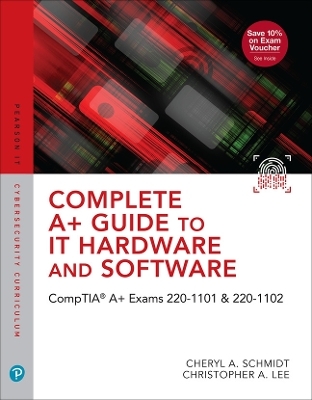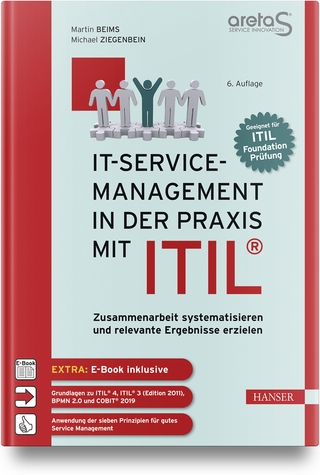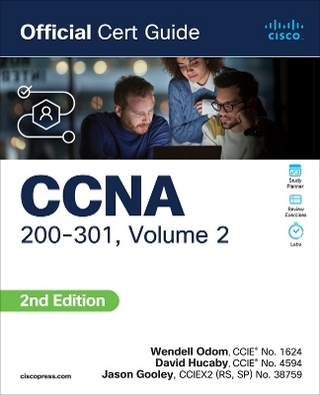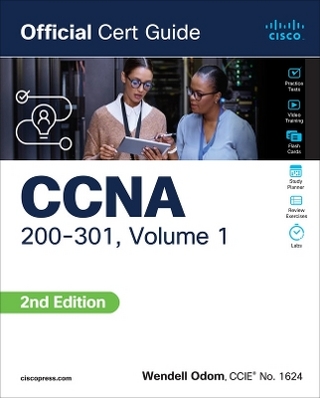
Complete A+ Guide to IT Hardware and Software
Pearson IT Certification (Verlag)
978-0-13-767044-4 (ISBN)
This is your all-in-one, real-world, full-color guide to connecting, managing, and troubleshooting modern devices and systems in authentic IT scenarios. Its thorough instruction built on the CompTIA A+ Core 1 (220-1101) and Core 2 (220-1102) exam objectives includes coverage of Windows 11, Mac, Linux, Chrome OS, Android, iOS, cloud-based software, mobile and IoT devices, security, Active Directory, scripting, and other modern techniques and best practices for IT management.
Award-winning instructor Cheryl Schmidt also addresses widely-used legacy technologies—making this the definitive resource for mastering the tools and technologies you'll encounter in real IT and business environments. Schmidt's emphasis on both technical and soft skills will help you rapidly become a well-qualified, professional, and customer-friendly technician.
Learn more quickly and thoroughly with these study and review tools:
Learning Objectives and chapter opening lists of CompTIA A+ Certification Exam Objectives make sure you know exactly what you'll be learning, and you cover all you need to know
Hundreds of photos, figures, and tables present information in a visually compelling full-color design
Practical Tech Tips provide real-world IT tech support knowledge
Soft Skills best-practice advice and team-building activities in every chapter cover key tools and skills for becoming a professional, customer-friendly technician
Review Questions—including true/false, multiple choice, matching, fill-in-the-blank, and open-ended questions—carefully assess your knowledge of each learning objective
Thought-provoking activities help students apply and reinforce chapter content, and allow instructors to “flip” the classroom if they choose
Key Terms identify exam words and phrases associated with each topic
Detailed Glossary clearly defines every key term
Dozens of Critical Thinking Activities take you beyond the facts to deeper understanding
Chapter Summaries recap key concepts for more efficient studying
Certification Exam Tips provide insight into the certification exam and preparation process
Now available online for free, the companion Lab Manual!
The companion Complete A+ Guide to IT Hardware and Software Lab Manual provides students hands-on practice with various computer parts, mobile devices, wired networking, wireless networking, operating systems, and security. The 140 labs are designed in a step-by-step manner that allows students to experiment with various technologies and answer questions along the way to consider the steps being taken. Some labs include challenge areas to further practice the new concepts. The labs ensure students gain the experience and confidence required to succeed in industry.
Cheryl Schmidt is a professor of Network Engineering Technology at Florida State College at Jacksonville. Prior to joining the faculty ranks, she oversaw LAN and PC support for the college and other organizations. She started her career as an electronics technician in the U.S. Navy. She teaches computer repair and various networking topics, including CCNA, network management, and network design. She has published other works with Pearson, including IP Telephony Using CallManager Express and Routing and Switching in the Enterprise Lab Guide. Cheryl has won awards for teaching and technology, including Outstanding Faculty of the Year, Innovative Teacher of the Year, Cisco Networking Academy Instructor Excellence Award, and Cisco Networking Academy Stand Out Instructor. She has presented at U.S. and international conferences. Cheryl keeps busy maintaining her technical certifications and teaching but also loves to travel, hike, do all types of puzzles, and read. Christopher Lee teaches Information Technology and Electronics at Florida State College at Jacksonville. A native of Greenville, South Carolina, Chris earned a bachelor's degree and a master's degree in Electrical Engineering from Georgia Institute of Technology. He taught his first computer programming classes at age 14! Since then, he has worked for a variety of companies including IBM, Nortel Networks, Evans Solutions, Convergys Corporation, NGA Human Resources, and himself. His experience spans several industries: Telecommunications, Youth Outside the Educational Mainstream, Information Technology, Higher Education, Human Resources Outsourcing, and Community Development. Chris has devoted countless volunteer hours in technology outreach. He enjoys helping children and adults (especially those in underserved communities) learn the skills or access the resources they need to be competitive in today's technological society. He has built strong partnerships with and implemented successful programs in organizations such as National Society of Black Engineers Jr (NSBE Jr), For Inspiration and Recognition in Science and Technology(FIRST) LEGO League, Northeast Florida STEM2 Hub, Tristan's Acceleration Academy, and Renaissance JAX.
Introduction ...............xxvii
Features of this Book ......xxviii
Chapter 1: Introduction to the World of IT ........ 1
Who Needs This Book? ............ 2
Technician Qualities .... 2
Breaking into IT with the CompTIA A+ Certification ................ 5
Basic Skills for This Course .... 5
Types of Computers ..... 8
Basic Computer Hardware ....... 8
Mice and Keyboards ..14
Common Peripherals .17
1s and 0s .............18
Safety Notes .......21
Chapter Summary ......22
Key Terms ...........23
Review Questions .......24
Exercises .............26
Chapter 2: Connectivity ......31
Introduction to Connectivity ..32
External Connectivity 32
Mouse and Keyboard Ports ....32
Video Ports .........33
Audio Ports .........44
eSATA Ports .......45
Modem and Serial Ports .........45
Network Ports ....47
Network Cabling ........48
Integrated Motherboard Ports 54
Getting to Know Ports.............54
Wireless Connectivity for Input Devices .....56
Chapter Summary ......57
Key Terms ...........59
Review Questions .......60
Exercises .............61
Activities .............64
Chapter 3: On the Motherboard...67
Introduction to the Motherboard ...................68
Processor Overview ...68
Processor Basics 69
Speeding Up Processor Operations Overview ....71
Clocking ..............72
Cache ...................73
Threading Technology .............73
Connecting to the Processor ..74
Multicore Processors .74
Graphics Processing Unit (GPU) ..................76
Introduction to Virtualization .76
Intel Processors ..77
AMD Processors ........78
CPU Sockets ......79
Processor Cooling ......80
Installing a Processor 82
Upgrading Processors 84
Overclocking Processors ........84
Installing CPU Thermal Solutions ................85
Troubleshooting Processor Issues .................86
Expansion Slots .87
PCI (Peripheral Component Interconnect) ..88
AGP (Accelerated Graphics Port) .................88
PCIe (Peripheral Component Interconnect Express) .................89
Motherboard Security Options ......................93
Types of Motherboards ...........94
Upgrading and Replacing Motherboards ....95
Motherboard Troubleshooting .......................96
Chapter Summary ......99
Key Terms .........101
Review Questions .....102
Exercises ...........104
Activities ...........106
Chapter 4: Introduction to Configuration ......109
Configuration Overview .......110
BIOS Overview ........110
The Setup Program ..111
Flash BIOS .......112
BIOS/UEFI Configuration Settings ............113
CMOS Memory ........117
Motherboard Battery .............118
Firmware Updates: Flashing/Clearing the BIOS/UEFI ...........118
Other Configuration Parameters ..................120
Hardware Configuration Overview.............123
Installing a USB Device .......124
Installing an eSATA Card .....128
Installing a Network Interface Card ...........129
Troubleshooting Configurations ..................130
Chapter Summary ....133
Key Terms .........133
Review Questions .....134
Exercises ...........136
Activities ...........140
Chapter 5: Disassembly and Power ...................143
Disassembly Overview ..........144
Electrostatic Discharge (ESD) .....................144
Electromagnetic Interference (EMI) ..........146
Tools ..................147
Disassembly .....148
Reassembly .......156
Preventive Maintenance ........156
Basic Electronics Overview .159
Power Supply Overview .......163
Replacing or Upgrading a Power Supply ..170
Power Protection ......172
Symptoms of Power Supply Problems ......173
Chapter Summary ....177
Key Terms .........179
Review Questions .....180
Exercises ...........182
Activities ...........184
Chapter 6: Memory ....187
Memory Overview ...188
Memory Physical Packaging188
Planning a Memory Installation ..................189
Installing Memory Overview .......................200
Virtual RAM ....202
Monitoring Memory Usage in Windows ...203
Older Applications in Windows ..................204
Troubleshooting Memory Problems ...........205
Removable Storage ..207
Chapter Summary ....211
Key Terms .........212
Review Questions .....213
Exercises ...........215
Activities ...........221
Chapter 7: Storage Devices ...........223
Storage Devices Overview ...224
Hard Drive Overview ............225
Solid-State Drive (SSD) Overview .............227
Mechanical Drive Interfaces Overview .....229
M.2 and NVMe230
PATA, SATA, and SAS Connectivity .........231
Storage Device Configuration Overview ...235
System BIOS/UEFI Configuration for Storage Devices .........241
Hard Drive Preparation Overview ..............242
Windows Disk Management 250
Fault Tolerance 253
Windows Storage Spaces ......255
Disk Caching/Virtual Memory ....................256
Troubleshooting Storage Devices Overview .....258
Data Loss and Corruption ....260
Troubleshooting New Storage Device Installation ...................260
Troubleshooting Previously Installed Storage Devices ...........262
RAID Issues .....265
SSD Issues ........266
Chapter Summary ....268
Key Terms .........271
Review Questions .....272
Exercises ...........274
Activities ...........277
Chapter 8: Video and Multimedia Devices.....279
Multimedia Devices Overview ....................280
Video Overview ........280
Video Cards ......280
Projectors ..........287
Introduction to Audio ............289
Installing Sound Cards ..........292
Sound Cards Using Windows ......................293
Speakers ............295
Troubleshooting Sound Problems ..............296
Optical Drive Overview ........297
Optical Drive Installation .....300
Troubleshooting Optical Drive Issues ........300
Scanners ............302
Other Multimedia Devices ...305
Chapter Summary ....309
Key Terms .........310
Review Questions .....311
Exercises ...........313
Activities ...........315
Chapter 9: Printers and Multifunction Devices .....317
Printer/Multifunction Device Overview ....318
Categories of Printers ............318
Impact Printers .319
Inkjet Printers ...321
Laser Printers ...323
Thermal Printers .......327
3-D Printers ......329
Paper ..................332
Virtual Printing 334
Refilling Cartridges, Re-inking Ribbons, and Recycling Cartridges 335
Upgrading Printers ...336
Printer Maintenance .336
Printer Installation Overview .......................342
Installing Multifunction Devices .................343
USB Printer Installation ........343
Printers in the Windows Environment .......344
Printer Sharing .349
Cloud Printing/Scanning .......354
General Printer Troubleshooting .................355
USB-Attached Printer Troubleshooting .....359
Windows Printer Troubleshooting ..............359
Impact Printer Troubleshooting ...................362
Inkjet Printer Troubleshooting .....................363
Laser Printer Troubleshooting .....................363
Chapter Summary ....366
Key Terms .........368
Review Questions .....369
Exercises ...........371
Activities ...........372
Chapter 10: Mobile Devices ..........375
Mobile Device Overview ......376
Using Mobile Devices ...........382
Cell Phones .......385
Mobile Apps .....387
Mobile Device Wired Connectivity ............390
Mobile Device Wireless Connectivity .......393
Mobile Device Email Configuration ..........399
Mobile Device Synchronization and Backup ....401
Other Mobile Software Tools ......................408
Laptops Overview ....410
Laptop Hardware ......410
Laptop Power ...415
Laptop Repairs Overview .....418
Laptop Display 433
Mobile Device Security ........440
Mobile Device Travel and Storage .............447
Mobile Device Troubleshooting Overview ........447
Chapter Summary ....462
Key Terms .........465
Review Questions .....466
Exercises ...........468
Activities ...........470
Chapter 11: Computer Design and Troubleshooting Review ..473
Design Overview ......474
Computer System Design .....474
Motherboard and Associated Component Design ....................481
Power Supply and Case Design ..................481
Storage Subsystem Design ...483
Audio Subsystem Design .....483
Display Subsystem Design ...484
Troubleshooting Overview ...485
Step 1. Identify the Problem 486
Step 2. Establish a Theory of Probable Cause (Question the Obvious) ...................487
Step 3. Test the Theory to Determine the Cause ......................495
Step 4. Establish a Plan of Action to Resolve the Problem and Implement the Solution ............497
Step 5. Verify Full System Functionality and, If Applicable, Implement Preventive Measures .497
Step 6. Document the Findings, Actions, and Outcomes ........497
Sample Troubleshooting Flowcharts ..........498
Chapter Summary ....502
Key Terms .........504
Review Questions .....505
Exercises ...........506
Activities ...........511
Chapter 12: Internet Connectivity, Virtualization, and Cloud Technologies .......515
Internet Connectivity Overview ..................516
Dial-up Connectivity .............516
Cable Modems .518
xDSL Modems .519
VoIP ...................520
Fiber Networks 522
Satellite Modems ......524
Mobile Connectivity Overview ...................525
Web Browsers ..528
Basic Web Browser Issues ....531
Introduction to Virtualization .......................533
Desktop Virtualization Basics ......................534
Cloud Computing .....537
Chapter Summary ....543
Key Terms .........545
Review Questions .....546
Exercises ...........547
Activities ...........549
Chapter 13: Networking ...551
Networking Overview ...........552
Network Media Overview ....559
Ethernet over Power 568
Protecting Your Network and Cable Investment .......................569
The OSI Model 573
The TCP/IP Model ...575
Network Addressing 577
More IPv4 Addressing ..........578
Wireless Networks Overview ......................581
Wireless Network Standards 582
Wireless Network Components ...................583
Wireless Network Design .....585
Antenna Basics 590
Wireless and Wired Client Device Configuration Overview ..594
Configuring an End Device: IP Addressing .......594
Adding a Computer to a Windows Domain .......601
Wireless NIC–Specific Settings ..................601
Advanced NIC Properties .....603
NIC Configuration When Using Virtualization .603
Thin or Thick Client Installation Overview .......605
Wireless AP/Router Configuration .............607
WWAN Cellular Configuration ...................608
IoT and Smart Devices ..........609
Network Troubleshooting .....611
Troubleshooting Cable and DSL Modems 619
Networking Multifunction Devices ............619
Network Servers .......621
Embedded, SCADA, and Legacy Systems ........622
Software-Defined Networking .....................623
Network Terminology ...........624
The TCP/IP Model in Action .......................625
More Windows Network Settings ...............627
Introduction to Shared Folders ....................632
Chapter Summary ....635
Key Terms .........637
Review Questions .....639
Exercises ...........642
Activities ...........648
Chapter 14: Introduction to Operating Systems ...651
Operating Systems Overview ......................652
User Interaction with Operating Systems .653
Overview of Popular Operating Systems ..654
32-Bit vs. 64-Bit Operating Systems .........655
Windows 10 and Windows 11 Versions .....656
Workstation Operating Systems ..................657
Operating Systems for Mobile Devices .....657
End-of-Life (EOL) Concerns .......................658
Update Limitations ..658
Compatibility Concerns ........659
Corporate Operating System Needs ...........660
Basic Windows Usage Overview ................661
Windows 10 and Windows 11 Desktop Components ..............663
Shortcuts and Tiles ...669
Recycle Bin ......670
Interactions Within a Window .....................670
Managing Windows Files and Folders .......672
Searches and Indexing ..........678
Attributes, Compression, and Encryption .679
Introduction to Windows Control Panel Utilities .....................682
Determining the Windows Version .............685
Windows Registry ....686
Editing the Windows Registry .....................687
Backing Up Data ......688
WinRE ...............688
Recovering the Windows OS .......................688
Chapter Summary ....690
Key Terms .........691
Review Questions .....692
Exercises ...........693
Activities ...........695
Chapter 15: Introduction to Scripting ..............697
Scripting Overview ..698
Command Prompt Overview .......................699
Command Prompt Basics .....699
Moving Around from a Command Prompt ........701
The md and rd Commands .705
Two Useful Commands: del and type .706
Copying Files ...706
The attrib Command ......708
Why Learn Commands? .......708
PowerShell ........708
Other Commands You Should Look Over 709
Command Format ....710
Introduction to Scripting .......734
Script File Types .......735
Use Cases for Scripting ........736
Mitigating Consequences of Scripting .......737
Environment Variables ..........738
Script Syntax ....740
Introduction to Script Programming ..........741
Variables ............741
Data Types ........743
Examples of Using Variables .......................744
Comments Within Scripts .....745
Basic Script Constructs .........746
Decisions: The Selection Structure.............746
Compound Conditions and Logical Operators ..750
Loops: The Repetition Structure .................751
A Brief Look at VBScript and PowerShell ........753
Chapter Summary ....756
Key Terms .........757
Review Questions .....758
Exercises ...........759
Activities ...........760
Chapter 16: Advanced Windows .763
Advanced Windows Overview ....................764
Preinstallation of Windows ..764
Installation/Upgrade of Windows ...............774
Corporate Windows Deployment ................775
Verifying the Installation ......776
Troubleshooting a Windows Installation ...777
Reloading Windows .779
Windows Updates ....780
Backing Up the Windows Registry and Data ....781
Configuring Windows Overview .................783
Configuring Windows ...........784
Adding Devices ........784
Installing/Removing Software .....................792
Computer Management Console .................796
System Tools ....797
User Account Management ..801
Managing Storage ....807
Managing Services and Applications .........811
Data Sources (ODBC) ...........812
Print Management Console ..813
Overview of the Windows Boot Process ...814
System Restore .....815
Windows Recovery Environment (WinRE) ..................816
Startup Settings Menu ...........819
System Configuration Utility .......................820
Task Manager ...824
Speeding Up the Windows Boot Process ..826
Troubleshooting the Windows Boot Process .....827
Black Screen/Video Issues ...829
Troubleshooting a Service That Does Not Start .......................831
Slow Boot .........832
Troubleshooting Windows Network Settings ....833
Windows Reboots/System Instability ........835
Shutdown Problems .835
Summary of Troubleshooting Steps ...........836
Power Options..836
Monitoring System Performance ................838
Supporting Windows Computers Remotely .......843
Preventive Maintenance for Your Operating System ...............846
Chapter Summary ....848
Key Terms .........850
Review Questions .....851
Exercises ...........852
Activities ...........854
Chapter 17: macOS and Linux Operating Systems ......................857
Introduction to macOS ..........858
Navigating the User Interface ......................859
Basic System Usage, Updates, and Backups .....862
Management and Troubleshooting Tools ..866
Utilities ..............869
Introduction to Linux ............878
Navigating the GNOME User Interface ....879
Basic System Usage, Updates, and Backups .....880
Command-Line Interface ......883
macOS and Linux Best Practices ................892
Chapter Summary ....893
Key Terms .........894
Review Questions .....895
Exercises ...........896
Activities ...........897
Chapter 18: Computer and Network Security .......899
Security Overview ....900
Security Policy .900
Physical Security ......901
Logical Security .......908
Considering the End User ....912
Licensing ...........912
Security Threats and Vulnerabilities ...........915
Protecting Access to Local and Network Resources ................920
Permissions .......928
Folder Options .934
Protecting the Operating System and Data ........935
Internet Security .......942
Remote Access to Network Devices ..........955
Internet Appliances ..956
Wireless Network Security Overview ........957
Security Incident Response ..964
A Final Word About Security ......................966
Chapter Summary ....968
Key Terms .........969
Review Questions .....971
Exercises ...........973
Activities ...........975
Chapter 19: Operational Procedures ................977
Operational Procedures Overview ..............978
Proper Power Handling and Adverse Power Conditions .........986
IT Documentation ....994
Change Management .............999
Chapter Summary . 1012
Key Terms ...... 1014
Review Questions .. 1015
Exercises ........ 1017
Activities ........ 1018
Appendix A: Subnetting Basics 1021
Appendix B: Certification Exam Objectives (Online)
Glossary 1025
9780137670444, TOC, 7/29/2022
| Erscheinungsdatum | 23.09.2022 |
|---|---|
| Verlagsort | Upper Saddle River |
| Sprache | englisch |
| Maße | 100 x 100 mm |
| Gewicht | 2670 g |
| Themenwelt | Informatik ► Weitere Themen ► Zertifizierung |
| ISBN-10 | 0-13-767044-3 / 0137670443 |
| ISBN-13 | 978-0-13-767044-4 / 9780137670444 |
| Zustand | Neuware |
| Haben Sie eine Frage zum Produkt? |
aus dem Bereich


